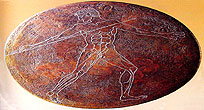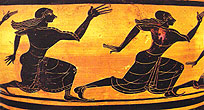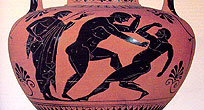 |
 |
 |
 |
 |
 |
|
 |
 |
|
|
 |
|
 |
|
 |
 |
|
|
|
|
 |
|
|
|
|
|
|
|
|
|
|
| |
 |
 |
|
 |
 |
|
 |
|
 |
|
| |
|
 |
|
| |
|
|
|
THE RELIGIOUS CHARACTER
OF THE ANCIENT OLYMPIC GAMES
In the beginning, the ceremonies
had a religious character and were connected with agricultural worship,
germination or with the worship of a god or hero. At these religious
festivals, the practice of the athletic games was established. The
athletes came at the stadium to compete for a self-governing value
that came from within them and their victory was an offer to the
god. The combination between religion and athletic games showed
that victory was a gift from god and that any kind of violation
of the rules of an honest contest was sacrilegious and, consequently,
an act of blasphemy.
Initially, the Olympiad had a funereal character and Pisatans gave
honors to Pelops, the king of Pisa, and the mythical founder of
the games, at Olympia. Close to the temple of Zeus there was a sacred
and revered place, the Pelopeion, where a black ram was sacrificed
every year in the honor of Pelops.
In antiquity, there was no other people, except for the ancient
Greeks, with such a passionate love for sports. They believed that
athletics were not only entertainment, but also exercises for the
body and mind.
|
|
|
|
 |
|
 |
|
 |
|
 |
|
 |
|
 |
|
 |
|
 |
|
 |
|
| |
 |
|
| |
|
 |
|
|
|
|
THE FIRST OLYMPIADS
After the descent of
the Dorians, the games were established by Oxylus, leader
of the Aetolo - Dorian tribes. Later, the Olympiads were neglected
until the time of Iphitus, king of the Eleans , who brought
again the games into attention. Since the time of Pelops and
Heracles to the first historically recorded Olympiad, it was
estimated that the games were not held for 112 years, a total
of 28 Olympiads.
The first ancient Olympiad took place in 776 BC. At the time,
the ”Sacred Truce” was declared by Iphitus, Cleisthenes
of Pisa and Lycurgus of Sparta. With the reestablishment,
the Olympic Games contributed to the strengthening of the
relations between the Greek city-states. The sacred character
of the Games compelled the participants to be free of any
hostile intention, because they believed they were protected
by god. As time passed, the Olympic Games became the most
important of all celebrations and developed the athletic spirit.
The testimony of Thucydides, saying that the athletes competed
naked at the games, also indicates a progressive separation
from religion and evolution to a pure and unique athletic
event.
The Olympiads were held every four years, at the end of a
period that coincided with the eighth lunar month of the Eleans.
As a result of this, the games were either in the month of
Apollonios (August/September) or in the month of Parthenios
(September/October). According to Pausanias, the thirteen
Olympiads held between 776-728 BC had but one sport, named
the stadion, which was a foot race on the Olympic stadium,
178 - 179 meters long. In the first Olympiads, the reward
was an apple and later a wreath from the Kallistephanos olive
tree. The branch was cut off with a golden sickle by a child
whose parents were both alive.
At the 14th Olympiad, in 724 BC, the diaulos, a race of two
stadia was added, while at 15th Olympiad, in 720 BC, the innovation
was the dolichos, a long distance race. Beginning with the
18th Olympiad, in 708 BC, the pentathlon and the wrestling
were included. In the 23rd Olympiad, in 688 BC, boxing appeared,
and in 680 BC, in the 25th Olympiad, the chariot race was
added as an event.
Only during the 65th Olympiad, in 520 BC was the race in armour
included. In the meantime, other sports were added up to 200
BC, when the pankration event for boys was included in the
Olympic program, which finally consisted of sixteen events.

|
|
|
|
|
|
 |
|
 |
|
|
|
|
 |
|
|
|
|
 |
|
| |
|
| |
|
|
THE HERAIA
Besides the Olympic Games for
men, every four years in Olympia were also held, from very early
times, the heraia, which were foot races for women in honour of
Hera. As it appears, these female games were even more ancient than
the Olympic games.
Heraia were games of pre-Dorian origin which, according to the legends,
were organized for the first time by Hippodamia in her desire to
honour Hera and express her gratitude for her marriage to Pelops.
In the ancient time, the organization of the games was carried out
by sixteen women from prominent Elean families who also acted as
judges. Every four years, sixteen female Eleans wove the peplos
of the goddess and organized a foot race for virgins. The virgins
were divided, according to age, into three categories and had to
run a distance equal with 5/6th of the stadium.
The winner was crowned with an olive branch and the legend says
she gained strength from Hera after she had eaten the meat given
from the cow sacrificed in the honour of the goddess.
|
|
|
|
| |
 |
|
| |
|
|
THE CULTURAL CONTRIBUTION
OF THE ANCIENT GAMES
The contribution of the Olympic games to the cultural course of
Hellenism is huge. At Olympia, a very strong feeling of national
awareness developed. The “Sacred Truce” gave unique opportunities
for honest rivalry and healthy competition which reflected the ideals
of the Greek culture in the best possible way. Rhetoricians, sophists,
philoso-phers, poets, politicians and historians were involved with
the Olympic ceremonies and poets like Pindar, Simonides and Bacchylides
were the representatives of the ancient athletic poetry. The sculpture
depicted, in the finest way, the athletic vigor and body perfection.

|
|
|
|
|
|
| |
 |
|
 |
|
| |
|
|
|
|
GODS IN ANCIENT GREECE
 Zeus
was the supreme ruler of the gods and “the mortals”, protector
of Greece and master of the weather. His symbols were the eagle
and the oak tree. Zeus
was the supreme ruler of the gods and “the mortals”, protector
of Greece and master of the weather. His symbols were the eagle
and the oak tree.
 Hera
was Zeus’ third wife, protectress of marriage, mothers and
home. Hera
was Zeus’ third wife, protectress of marriage, mothers and
home.
 Athena
was Zeus’ daughter, goddess of wisdom,
guardian of all war heroes and of the city of Athens. Athena
was Zeus’ daughter, goddess of wisdom,
guardian of all war heroes and of the city of Athens.
 Apollo
was Zeus’ son, god of the sun,
music, healing and prophecy (his advice was sought at the oracle
of Delphi). Apollo
was Zeus’ son, god of the sun,
music, healing and prophecy (his advice was sought at the oracle
of Delphi).
 Artemis
was the twin sister of Apollo, goddess
of hunting and the moon, guardian of women and cities. Artemis
was the twin sister of Apollo, goddess
of hunting and the moon, guardian of women and cities.
 Hermes
was Zeus’ son, messenger of the
gods, god of commerce, orators and writers, protector of flocks,
thieves and travelers. Hermes
was Zeus’ son, messenger of the
gods, god of commerce, orators and writers, protector of flocks,
thieves and travelers.
 Ares
was Zeus’ son, god of war, unpopular
on Olympus and feared by the Greeks. Ares
was Zeus’ son, god of war, unpopular
on Olympus and feared by the Greeks.
 Aphrodite
was Zeus’ daughter, goddess of
love, beauty and gardens, and the most beautiful goddess in the
Olympus. Aphrodite
was Zeus’ daughter, goddess of
love, beauty and gardens, and the most beautiful goddess in the
Olympus.
 Hephaestus
was Zeus’ son, god of fire and
industry. Hephaestus
was Zeus’ son, god of fire and
industry.
 Poseidon
was Zeus’ brother, god of the
seas, rivers and earthquakes. Poseidon
was Zeus’ brother, god of the
seas, rivers and earthquakes.
 Demeter
was Zeus’ sister, goddess of
agriculture, protectress of crops. Demeter
was Zeus’ sister, goddess of
agriculture, protectress of crops.
 Hestia
was Zeus’ elder sister, beloved
goddess of fire and the earth, protectress of the house, family
and cities. Hestia
was Zeus’ elder sister, beloved
goddess of fire and the earth, protectress of the house, family
and cities.
 Dionysus
was Zeus's son by a mortal,
god of wine, revelry and hospitality. Dionysus
was Zeus's son by a mortal,
god of wine, revelry and hospitality.
 Asklepios
was Apollo's son, god of healing. Asklepios
was Apollo's son, god of healing.
 Hades
was ruler of the kingdom of the dead. Hades
was ruler of the kingdom of the dead.

|
|
|
|
| |
|
 |
|
 |
|
|
|
|
| |
|
 |
|
|
|
|
 |
 |
|
|
|
 |
 |
|
 |
 |
 |
|
 |
 |
|
|
|
|
|
|
|
|
|
|
|







